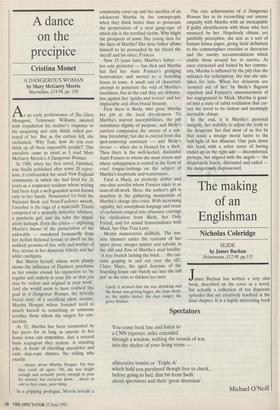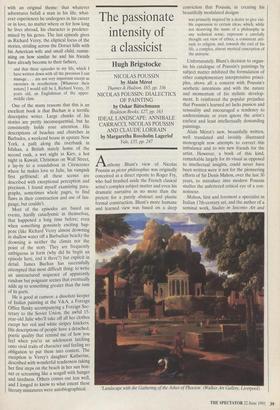The making of an Englishman
Nicholas Coleridge
SLIDE by James Buchan Heinemann, £12.99, pp.135 James Buchan has written a very slim book, described on the cover as a novel, but actually a collection of ten disparate episodes that are creatively resolved in the final chapter. It is a highly interesting book
with an original theme: that whatever adventures befall a man in his life, what- ever experiences he undergoes in his career or in love, no matter where or for how long he lives abroad, his character is predeter- mined by his genes. The last episode gives us Richard Verey, the eliptical focus of the stories, striding across the Dorset hills with his American wife and small child, rumin- ating on how similar he and his friends have already become to their fathers,
and that these episodes in my life, which I have written down with all the precision I can manage . .. are not very important except as exercises in recollection. [Whatever their nature] I would still be I, Richard Verey, 35 years old, an Englishman of the upper- middle class.
One of the many reasons that this is an excellent book is that Buchan is a terrific descriptive writer. Large chunks of his stories are pretty inconsequential, but he consistently holds your attention. His descriptions of beaches and churches in Barbados, a weekend house in upstate New York, a path along the riverbank in Isfahan, a British stately home of the second rank, a wet night in Kiev, a hot night in Kuwait, Christmas on Wall Street, a lay-by to a roundabout in Cirencester where he makes love to Julie, his vampish first girlfriend; all these scenes are described with exceptional perception and precision. I found myself examining para- graphs, sometimes whole pages, to find flaws in their construction and use of lan- guage, but couldn't. Most of the episodes are based on events, hardly cataclysmic in themselves, that happened a long time before; even when something genuinely exciting hap- pens (like Richard Verey almost drowning in shallow water off a Barbadian beach) the drowning is neither the climax nor the point of the story. They are frequently ambiguous in form (why did he begin an episode here, end it there?) but explicit in detail. James Buchan has successfully attempted that most difficult thing: to write an unstructured sequence of apparently random but poignant scenes that eventually adds up to something greater than the sum of its parts.
He is good at cameos: a dissolute keeper of Indian painting at the V&A, a Foreign Office flunky accompanying a Foreign Sec- retary to the Soviet Union, the awful 15- year-old Julie who'll take off all her clothes except her red and white stripey knickers. His descriptions of people have a detached, poetic quality that remind me of how you feel when you're an adolescent latching onto vivid traits of character and feeling no obligation to put them into context. The exception is Verey's daughter Katherine, described with wonderful tenderness taking her first steps on the beach in her sun bon- net or screaming like a seagull with hunger and tiredness. Others comes out less well, and I longed to know to what extent these literary miniatures were autobiographical.



























































 Previous page
Previous page